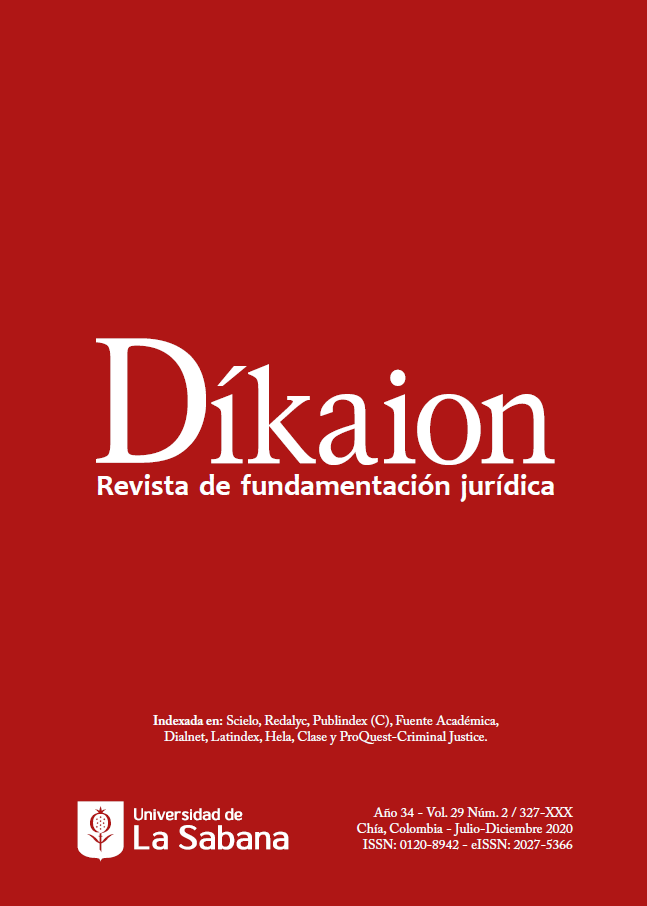Judicial Formalism, Activism, and Discretion
DOI:
https://doi.org/10.5294/dika.2020.29.2.1Keywords:
Legal technicality, judicial decisionism, judicial arbitrariness, constitutional review, judicial determination of lawAbstract
This article seeks to explain why the terms judicial “formalism” and “activism” are often used as antagonistic ways of discrediting judicial activity. Thus, it will be necessary to clarify that they have different meanings in diverse legal-professional contexts and even carry more than one meaning in the same context. However, this time we will focus on elucidating their pejorative sense. Then, we will argue that both terms, in some cases, are belittling because they identify ways of understanding the judicial function that do not take two essential elements—generally considered valuable—of current Western legal systems seriously: fundamental rights and democratic laws. Finally, we propose an alternative model to understand judicial activity compatible with these elements.
Para citar este artículo / To reference this article / Para citar este artigo
Juan B. Etcheverry, “Formalismo, activismo y discrecionalidad judicial”, en Díkaion 29, 2 (2020), 336-351. DOI: https://doi.org/10.5294/dika.2020.29.2.1
Downloads
References
Atienza, Manuel y Ruiz Manero, Juan, Las piezas del derecho. Teoría de los enunciados jurídicos, Barcelona, Ariel, 2007.
Atienza, Manuel, “Siete tesis sobre el activismo judicial”, Ámbito Jurídico, en https://dfddip.ua.es/es/documentos/siete-tesis-sobreelactivismojudicial.pdf?noCache=1540204326938, fecha de consulta: 10 de julio de 2019.
Berizonce, Roberto Omar, “Activismo judicial y participación en la construcción de las políticas públicas”, Revista del Instituto Colombiano de Derecho Procesal 36 (2010), en http://publicacionesicdp.com/index.php/Revistas-icdp/article/view/63
Corte Constitucional de Colombia, Sentencia C-141 de 2010.
Dalla Via, Alberto, “Los jueces frente a la política”, Isonomía 22 (2005), en http://www.scielo.org.mx/scielo.php?script=sci_arttext&pid=S1405-02182005000100002
Duquelsky, Diego, “La falsa dicotomía entre garantismo y activismo judicial”, Doxa 41 (2018), en https://doxa.ua.es/article/view/2018-n41-la-falsa-dicotomia-entre-garantismo-y-activismo-judicial
Dworkin, Ronald, “Is there really no right answer in hard cases”, en A Matter of Principle, Cambridge, Harvard University Press, 1986.
Dworkin, Ronald, Justicia para erizos, Buenos Aires, Fondo de Cultura Económica, trad. de H. Pons, 2014.
Dworkin, Ronald, Law´s Empire, Cambridge, Harvard University Press, 1986.
Dworkin, Ronald, Taking Rights Seriously, Cambridge, Cambridge University Press, 1978.
Etcheverry, Juan B. “La relevancia de la determinación judicial y la tesis de la respuesta más justa”, Dikaion 24 (2015), en https://dikaion.unisabana.edu.co/index.php/dikaion/article/view/5714
Etcheverry, Juan B. “La relevancia del derecho que remite a la moral”, Problema 4 (2010), en https://revistas.juridicas.unam.mx/index.php/filosofia-derecho/article/view/8093
García Mancilla, Manuel José, ¿Presunción de constitucionalidad o presunción de libertad? Un análisis desde el artículo 33 de la constitución nacional, Buenos Aires, Academia Nacional de Ciencias Morales y Políticas, 2014.
Kmiec, Katherine, “The origin and the current meaning of judicial activism”, California Law Review 92 (2004).
Manili, Pablo, “El activismo (bueno y malo) en la jurisprudencia de la Corte Suprema”, La Ley, 2006-D-1285.
Maraniello, Patricio Alejandro, “El activismo judicial, una herramienta de protección constitucional”, Revista de Ciencias Sociales 5 (2010), en https://dialnet.unirioja.es/servlet/articulo?codigo=4548361
Moore, Michael, “The semantics of judging”, Southern California Law Review 54 (1981), en https://heinonline.org/HOL/LandingPage?handle=hein.journals/scal54&div=15&id=&page=
Rodríguez-Blanco, Verónica, Law and Authority Under the Guise of the Good, Oxford, Hart Publishing, 2014.
Santiago, Alfonso, “Sistema jurídico, teoría del derecho y rol de los jueces. Las novedades del neo-constitucionalismo”, Dikaion 17 (2008), en https://dikaion.unisabana.edu.co/index.php/dikaion/article/view/1400
Schauer, Frederick, “Formalism”, Yale Law Journal 97 (1988), en https://digitalcommons.law.yale.edu/ylj/vol97/iss4/
Schauer, Frederick, Playing by the Rules, Oxford, Clarendon Press, 1991.
Sentencia Constitucional del Tribunal Constitucional Plurinacional de Bolivia 0084/2017.
Solum, Lawrence, “Originalism versus living constitutionalism: The conceptual structure of the great debate”, Northwestern University Law Review 113 (2019), en https://scholarlycommons.law.northwestern.edu/nulr/vol113/iss6/1/
Viciano Pastor, Roberto y Gabriel Moreno González, “Cuando los jueces declaran inconstitucional la constitución: la reelección presidencial en América Latina a la luz de las últimas decisiones de las cortes constitucionales”, Anuario Iberoamericano de Justicia Constitucional 22 (2018).
Zambrano, Pilar, “El derecho como razón excluyente para la acción: una aproximación desde la teoría iusnaturalista de John Finnis”, Problema 4 (2010).
Published
How to Cite
Issue
Section
License
Copyright (c) 2021 Díkaion

This work is licensed under a Creative Commons Attribution-ShareAlike 4.0 International License.
1. Proposed Policy for Journals That Offer Open Access
Authors who publish with this journal agree to the following terms:
This journal and its papers are published with the Creative Commons License Attribution-NonCommercial-NoDerivatives 4.0 International (CC BY-NC-ND 4.0). You are free to share copy and redistribute the material in any medium or format if you: give appropriate credit, provide a link to the license, and indicate if changes were made; don’t use our material for commercial purposes; don’t remix, transform, or build upon the material.









